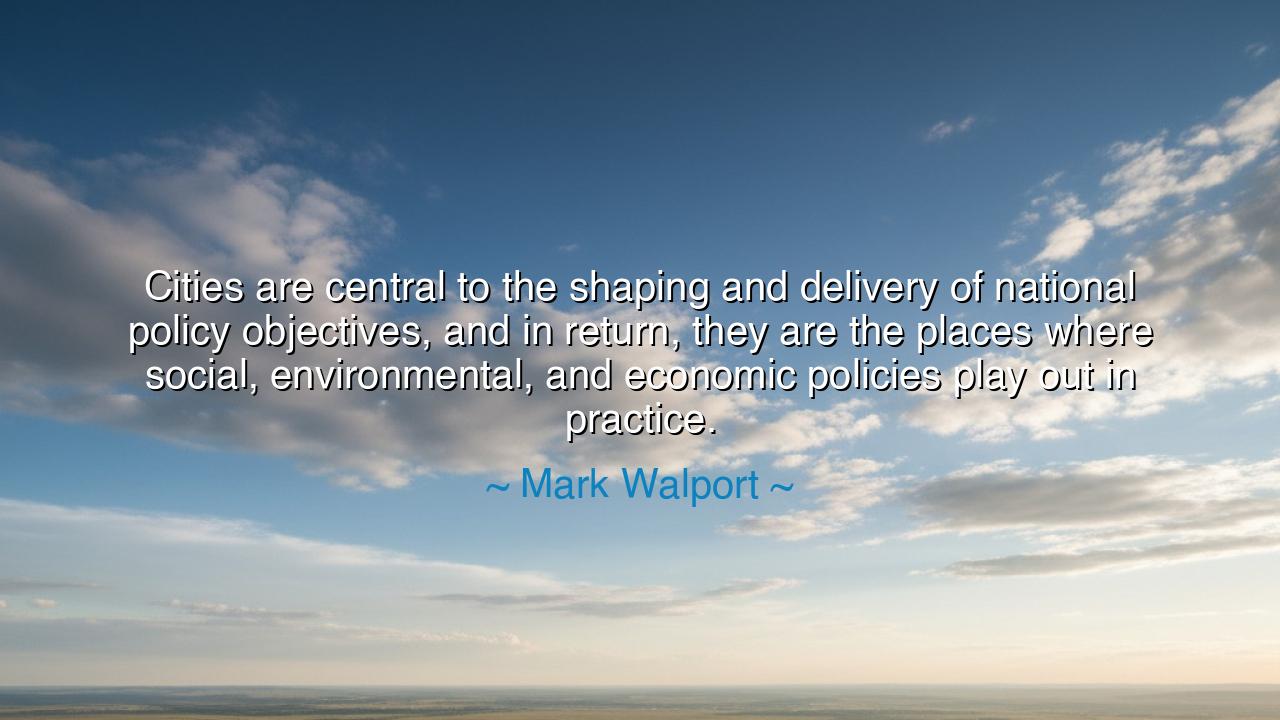
Cities are central to the shaping and delivery of national policy
Cities are central to the shaping and delivery of national policy objectives, and in return, they are the places where social, environmental, and economic policies play out in practice.






Hear the words of Mark Walport, spoken with clarity about the lifeblood of nations: “Cities are central to the shaping and delivery of national policy objectives, and in return, they are the places where social, environmental, and economic policies play out in practice.” These words remind us that though laws may be written in parliaments and decrees pronounced in capitals, it is in the crowded streets, in the marketplaces, in the neighborhoods of the many, that policies are given life—or shown to be hollow.
The meaning of this quote lies in the recognition that cities are the crucibles of civilization. They are not mere clusters of buildings but the arenas where human ambition, governance, and survival meet. When a nation declares goals for justice, prosperity, or sustainability, it is within cities that those goals must be tested. A law for cleaner air matters not in abstraction, but in whether children breathe freely on a city’s streets. A policy for economic growth is proven not in a ledger, but in whether families in crowded districts find work and dignity. Thus, cities are both the proving ground and the heartbeat of national purpose.
The origin of these words flows from centuries of history. From Athens to Rome, from Baghdad to London, from Beijing to New York, cities have been the centers where power and people converge. It was in Athens that democracy was not only imagined but lived, in the marketplace and assembly halls. It was in Rome that law, first carved for the few, was stretched and applied to millions across an empire. And in every age, it was in the cities that policies of empire touched daily life—where bread was distributed, where aqueducts brought water, where poverty and power stood side by side. Walport speaks in this tradition, affirming that the destiny of nations rests upon the daily reality of their cities.
History gives us an instructive example in the Industrial Revolution. In Britain, national policies promoting industry and trade found their living form in the growing cities of Manchester, Birmingham, and London. Yet these same cities also bore the scars of pollution, poverty, and overcrowding. The social policies of reformers, the environmental movements to clean water and air, and the economic adjustments for labor rights all played out not in distant theories, but in the streets of these urban centers. The health of the nation was inseparable from the health of its cities.
The lesson, then, is that to shape cities wisely is to shape nations. Neglect them, and the grandest policies will crumble into failure. Attend to them with foresight, and the smallest reforms may ripple outward to transform entire societies. Cities magnify both the strengths and the weaknesses of governance, for it is there that the density of human life makes every policy visible in sharp relief. To ignore the city is to ignore the place where the people’s voice is most clearly heard, and where the nation’s vision either succeeds or falters.
What then must we do? As citizens, we must look upon our cities not as mere places of work and dwelling, but as sacred stages upon which the future of our nations is played. We must demand that leaders craft policies with the realities of urban life in mind—policies that address housing, transportation, air quality, justice, and opportunity. We must, in our own lives, participate in the stewardship of our cities: conserving resources, building community, engaging in civic action, and remembering that the health of a city is bound to the health of all who live within it.
Thus, remember the wisdom of Mark Walport: *






AAdministratorAdministrator
Welcome, honored guests. Please leave a comment, we will respond soon